
-
Find the right food for your petTake this quiz to see which food may be the best for your furry friend.Find the right food for your petTake this quiz to see which food may be the best for your furry friend.Featured products
 Sensitive Stomach & Skin, assortiment de conserves
Sensitive Stomach & Skin, assortiment de conservesHill's Science Diet Sensitive Stomach & Skin Variety Pack
Shop Now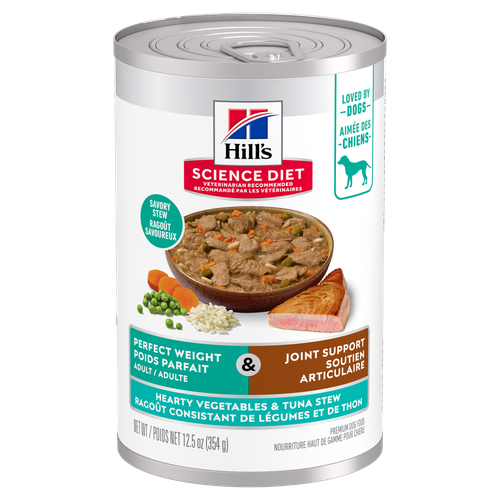 Adult Perfect Weight & Joint Support Hearty Vegetables and Tuna Stew Dog FoodShop Now
Adult Perfect Weight & Joint Support Hearty Vegetables and Tuna Stew Dog FoodShop Now Healthy Cuisine, Adulte, assortiment de conserves
Healthy Cuisine, Adulte, assortiment de conservesHill's Science Diet Healthy Cuisine Variety Pack
Shop NowFeatured products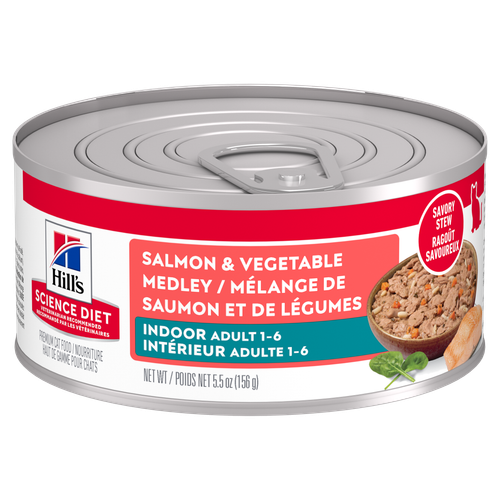 Adult Indoor Salmon & Vegetable Medley Cat Food
Adult Indoor Salmon & Vegetable Medley Cat FoodPrecisely balanced nutrition for indoor cats with the delicious taste of savory salmon and vegetables
Shop Now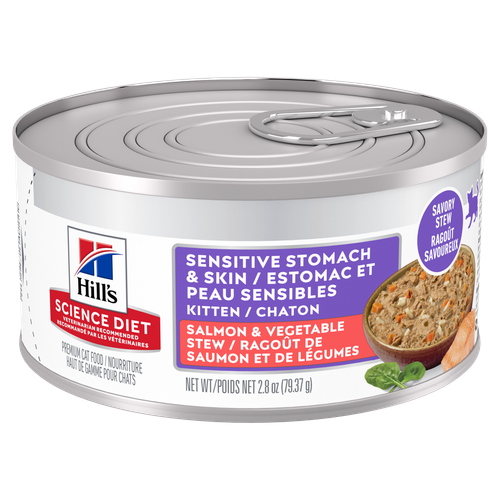 Kitten Sensitive Stomach & Skin Salmon & Vegetable Stew
Kitten Sensitive Stomach & Skin Salmon & Vegetable StewSupports kitten growth, digestive health, nourishes skin and promotes a lustrous fur
Shop Now Adult Urinary Hairball Control Savory Chicken Entrée cat food
Adult Urinary Hairball Control Savory Chicken Entrée cat foodSupports the health of the whole urinary system with optimal levels of magnesium
Shop Now -
Dog
- Dog Tips & Articles
-
Health Category
- Weight
- Food & Environmental Sensitivities
- Urinary
- Digestive
- Joint
- Kidney
- Dental
- Cancer
-
Life Stage
- Puppy Nutrition
- Adult Nutrition
- Senior Nutrition
Cat- Cat Tips & Articles
-
Health Category
- Weight
- Skin & Food Sensitivities
- Urinary
- Digestive
- Kidney
- Dental
- Stress
- Cancer
-
Life Stage
- Kitten Nutrition
- Adult Nutrition
Featured articles Pet Food Storage Tips
Pet Food Storage TipsDiscover how and where to store your dry, as well as canned, dog and cat food. Learn how to find the "best before" dates on all Hill's pet food packaging.
Read More Compare Your Pet Food's Calories to Other Brands
Compare Your Pet Food's Calories to Other BrandsCompare Hill's Science Diet dog and cat food's calories against other pet food brands and AAFCO recommended maximum calorie count.
Read More The Incredible Science Behind Your Pet's Microbiome
The Incredible Science Behind Your Pet's MicrobiomeLearn what a pet's microbiome is, how it contributes to your pet's gut & overall health, and why nutrition is important in maintaining healthy microbiomes.
Read More -
Digestive health for dogs
Digestive health for dogs
What are dog digestive issues?
A digestive disorder is any health situation that prevents your dog from properly digesting food or alters the rate that food passes through their digestive tract. Don’t ignore the signs! If your furry friend is showing symptoms of digestive disorders, seek immediate advice from your veterinarian.

Know the signs of distress
Some signs of your dog’s digestive problems are easy (and unpleasant) to spot. Make sure you consult with your vet if your dog shows any of these signs:








Know the signs of distress
Some signs of your dog’s digestive problems are easy (and unpleasant) to spot. Make sure you consult with your vet if your dog shows any of these signs:








What causes dog digestive problems?
Digestive upsets can happen for a variety of reasons, and all of them can make your dog feel under the weather. Here are some of the more common causes of digestive problems in dogs.


This is the most common cause of an ‘upset stomach’ in dogs. It usually consists of vomiting and diarrhea that begins suddenly but can just be diarrhea too. It can be caused by lots of things like eating something unsavoury (we all know our dogs love doing this!), parasites, viruses and foreign bodies, to name but a few.
Unlike the sudden onset upset we just mentioned, chronic enteropathies are slower to appear and tend to last a long time. Diarrhea and weight loss are common signs. Again, it can be caused by many different things such as adverse food reactions and genetics.
The colon is part of the large bowel and when this gets inflamed it’s called colitis. It’s usually very characteristic and most dogs show the same signs - looking like they urgently need to have a poop, they might strain to have a poop but not much comes out, and one of the classic signs of colitis is fresh blood and/or slimy mucus in the stools.
This is a serious condition in dogs and can be life-threatening. Common signs of pancreatitis are sudden onset vomiting, depression and lack of appetite. It’s also a very painful condition so your dog may be restless and adopt the ‘play bow’ position to try to ease the pain. If you have any concerns that your dog might have pancreatitis get them to the vet as soon as you can.
This complicated-sounding name describes a condition where dogs are lacking certain enzymes needed for digestion. The pancreas produces some of these and when they are lacking the food passes straight through without the dog being able to get at the nutrients. Dogs with EPI tend to be ravenously hungry but still lose weight and look in poor condition. Because they don’t digest fat well, their stools may be greyish in colour. Some breeds such as German shepherds are more prone to it than others. Usually supplementing the diet with the missing enzymes gives a good result.
Dogs can react badly to certain foods for a number of reasons and together we call these adverse food reactions. True food allergies are rarer than people think and they tend to be caused by proteins in foods such as beef and chicken. Food allergies can cause vomiting and diarrhea and also skin issues like itchiness.
The same as in humans, when dogs are constipated, they find pooping difficult and they might go to the toilet much less frequently. Constipation can be caused by lots of things. Eating bones can make the stools hard and difficult to pass, dehydration or a sluggish bowel will also mean that the stools are dry and difficult to shift.
How can you help?
First, if you suspect your dog is suffering from a digestive disorder, talk to your vet about treatments that may be able to help. You can further help your dog by reducing the amount of stress triggers in their environment with some of these suggestions:


Stick with a routine
Dogs love predictability. Knowing they can anticipate when you’ll arrive home, when meals will appear and when it’s time for a walk will help keep your dog’s anxiety to a minimum.


Accessorize
There are a variety of products on the market intended to help calm your dog. Ask your veterinarian for a recommendation that could help address your dog’s stress response in anxiety-inducing situations.


Consider their nutrition
Foods made with highly digestible ingredients can be gentle on upset tummies. Ask your veterinarian about switching your dog’s food and how to do it without upsetting your dog’s stomach any further.
How can you help?
First, if you suspect your dog is suffering from a digestive disorder, talk to your vet about treatments that may be able to help. You can further help your dog by reducing the amount of stress triggers in their environment with some of these suggestions:


Stick with a routine
Dogs love predictability. Knowing they can anticipate when you’ll arrive home, when meals will appear and when it’s time for a walk will help keep your dog’s anxiety to a minimum.


Accessorize
There are a variety of products on the market intended to help calm your dog. Ask your veterinarian for a recommendation that could help address your dog’s stress response in anxiety-inducing situations.


Consider their nutrition
Foods made with highly digestible ingredients can be gentle on upset tummies. Ask your veterinarian about switching your dog’s food and how to do it without upsetting your dog’s stomach any further.
Talk to your vet about which digestive dog food is right for your pet
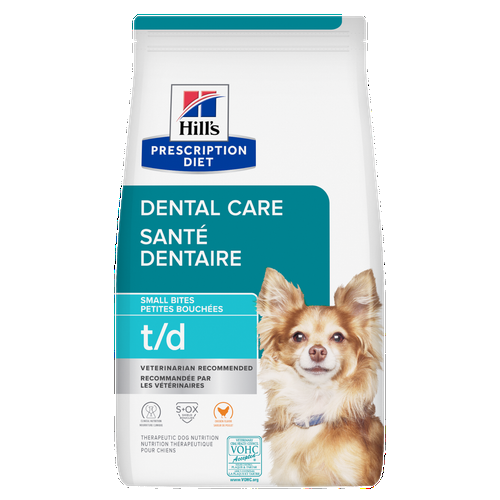
Hill's Prescription Diet t/d Small Bites Dog Dry Food is clinically shown to reduce plaque, stain & tartar buildup and clean up to the gum line in small dogs. It is formulated as a complete and balanced nutritional solution for your dog's daily health regimen. The kibble size is designed to meet the needs of your smaller dog.
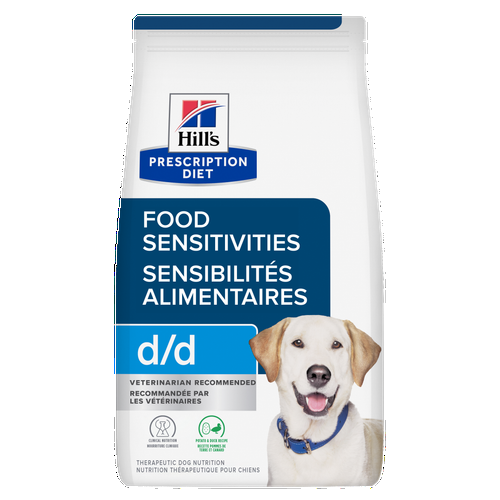
Limited ingredient dog food to support your dog's food sensitivities

Limited ingredient dog food to support a dog's food sensitivities
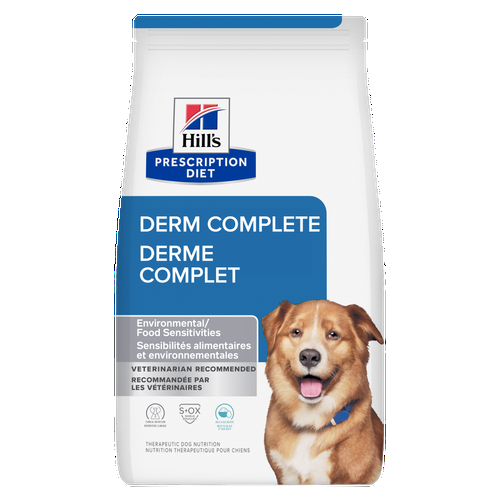
Clinical nutrition specially formulated to help manage environmental & food sensitivities in dogs
Related articles

Learn why grapes & raisins are poisonous for dogs, how to manage the situation if they've eaten them, symptoms to watch for, and when to go to the vet.

Learn whether almonds & related products like almond butter are safe for dogs, including why they can be a health issue and how much can be problematic.

Learn whether carrots are good for your dog, ingredients in carrots that can provide health benefits, whether raw vs. cooked are a better option, and more.

Learn whether cinnamon is safe for your dog, what to do if they got into cinnamon bark, oil, sticks or spice, and what quantity of it is a health concern.

